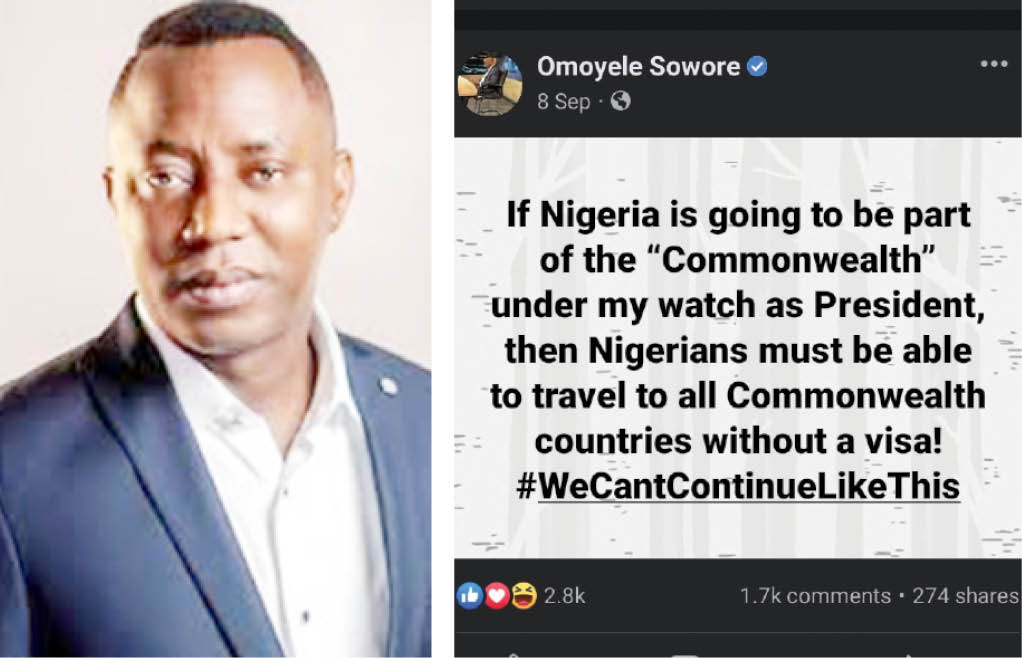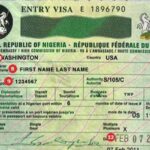Claim
The presidential candidate of the African Action Congress (AAC), Omoyele Sowore, has claimed that Nigerians will travel to all the 56 Commonwealth countries without a visa when he becomes the next president of Nigeria in 2023, if the country is to continue with its membership with the union.
Verdict
This is false. The commonwealth is a conglomeration of free and independent countries seeking a common goal in development of their individual countries by ascribing to the objective of the organisation, also decisions made are not binding to countries.
Full text
The presidential candidate of the African Action Congress (AAC), Omoyele Sowore, recently posted on his Facebook wall that “If Nigeria is going to be part of the “Commonwealth” under my watch as president, then Nigerians must be able to travel to all commonwealth countries without a visa!”
Sowore, a radical and anti-establishment politician, did not state the reason why free non-visa travelling for Nigerians would be a major reason to the organization, but it could be inferred that he viewed Nigeria participating in an organization birthed by its colonizer, United Kingdom.
What is the Commonwealth
A journal written by Alexander C. Ugwukah described the commonwealth as an association of countries that retained close relations with the United Kingdom and whose heads of governments meet together frequently to discuss matters of common interest.
While the concept of close relations with the United Kingdom is central to the organization, it has evolved to absolve countries that do not have historical ties to the country.
The creation of the commonwealth in the late 19th Century also signified the beginning of the crumbling of the British empire as the pioneering members which include countries like Canada, New Zealand, Ireland and South Africa, which had then became a dominion, sought the end of interference in their political affairs with the aim of not being obliged to carry out acts promulgated by the British parliament.
With the independence of third world countries, the organization began to admit its former colonies while dropping the name British Commonwealth to the Commonwealth of Nations.
Before then, Ugwukah noted that a meeting called Balfour declaration had made clear that “all member states of the organization were autonomous within the British empire, equal in status and that they were in no way subordinate one to another in any respect of their domestic and foreign affairs, even though they were united by a common allegiance, yet they were freely associated as members of the British Commonwealth of Nations.”
Even though the organization is dominated by countries colonized by British, some countries like Myanmar, Republic of Yemen, Egypt, Iraq Jordan, Palestine, Sudan, Somali Kuwait, Bahrain, Oman, Qatar and the United Arab Emirates were former British protectorates, they did not become members of the Commonwealth after their independence while Ireland withdrew its membership.
This might be due to the criticism of the intent of the association with Irom Obar in a paper titled “The Contributions of Commonwealth to World Diplomacy: 1960-Present” saying that the transformation of the British Empire to a friendly organ of nations willingly entering into a relationship that did not hinder their freedom of action or thought may be the greatest monument of British adaptability and ingenuity.
He argued that for the British to launch an initiative changing its role to countries it is historically bound from that of dominance to fraternity, has been able to allay bitterness which would have been directed against her by the people she has finally released from tutelage.
He claimed that “Most nationalities, especially from former French territories, have claimed that the timely transformation of the British Empire into a Commonwealth was a subtle move to ensure British influence in the domination of territories she could no longer rule by direct means and thus along with subjugating African unity, they felt that grouping independent states in such a way as to keep alive the memory of their colonial orientation and bringing to bear upon them the pressure of British and white dominion Diplomacy to guide their foreign policy into the same orbit as Britain.”
What are the benefits of membership
On its website, the Commonwealth said its “member countries benefit from being part of a mutually supportive community of independent and sovereign states, aided by more than 80 Commonwealth organisations.”
It added that it supports members to achieve development, democracy and peace and a vocal voice for small and vulnerable states while a champion for young people.
“We help to strengthen governance, build inclusive institutions and promote justice and human rights. Our work helps to grow economies and boost trade, empower young people, and address threats such as climate change, debt and inequality.”
It said its work supports the United Nations Sustainable Development Goals and the Paris Agreement on Climate Change as well as provide training and technical assistance and support decision-makers to draw up legislation and deliver policies.
“We deploy experts and observers who offer impartial advice and solutions to national problems. We also provide systems, software and research for managing resources.”
Why countries require visa for visitors
A bogpost by Passport Index said visas are important to enter a country to check and control the flow of visitors in and out of the country and to prevent illegal immigration and other criminal activities.
It said allowing travellers to apply for a visa allows the government authorities to check potential visitors. ‘For example, individuals may attempt to travel to a country with better economic opportunities in order to work there illegally.”
It however said many countries have visa policies and agreements that allow their citizens to travel freely between them without the need for a visa and most visa policies are bilateral.
Can Nigeria get free visa?
A lecturer of History at the University of Jos, Dr Jimam T. Lar, said the idea of Nigeria getting free visas to the countries is dead on arrival as the organisation has a non binding policies, thus, getting free visa has to be a bilateral agreement with individual countries.
“There are no binding principles with these countries. In the international system, visa entry rules are bilateral, it is one country to another. However, there are multilateral agreements based on regional bodies like ECOWAS. We have free entries and you don’t need your visa to go to any west African countries. You just need your ECOWAS passport and a card.”
“Just like when Britain left the European Union, now they need a visa to go the EU and EU citizens need a visa to come into UK. There are bilateral relations between UK and US, UK, Canada and Australia but we don’t have such. So, it is left for the president to use foreign policy initiatives to get such bilateral access.”
But when you are doing that, you have to also ask yourself if there is a demand from the other country to also come to your country, that has to also be in place. It has to be a two-way thing. So, my point will be that the commonwealth is not a regional organisation that has visa free entry but we are an association of former colonies, so it is a different application and I think it is a demand or request that is dead on arrival.”
On what Nigeria will lose if it pulls out of the organisation, he said the Commonwealth has particular gains and sometimes these gains are not tangible ones.
“If you want to emphasize on tangible gains, it is the commonwealth association of universities and we have scholarships to the commonwealth games. There are those tangible ones but the more important one is the relationship amongst the countries and there are things we have contributed too.”
Conclusion
Even if Nigeria decides to withdraw from the Commonwealth, it is unlikely that Sowore would succeed for Nigerians to gain free visa to all the countries in the Commonwealth as such agreement is often made during a bilateral agreement.
So, it will not be achieveable if he becomes the president.
This fact-check is supported by Code for Africa through the Daily Trust Foundation.

 Join Daily Trust WhatsApp Community For Quick Access To News and Happenings Around You.
Join Daily Trust WhatsApp Community For Quick Access To News and Happenings Around You.


